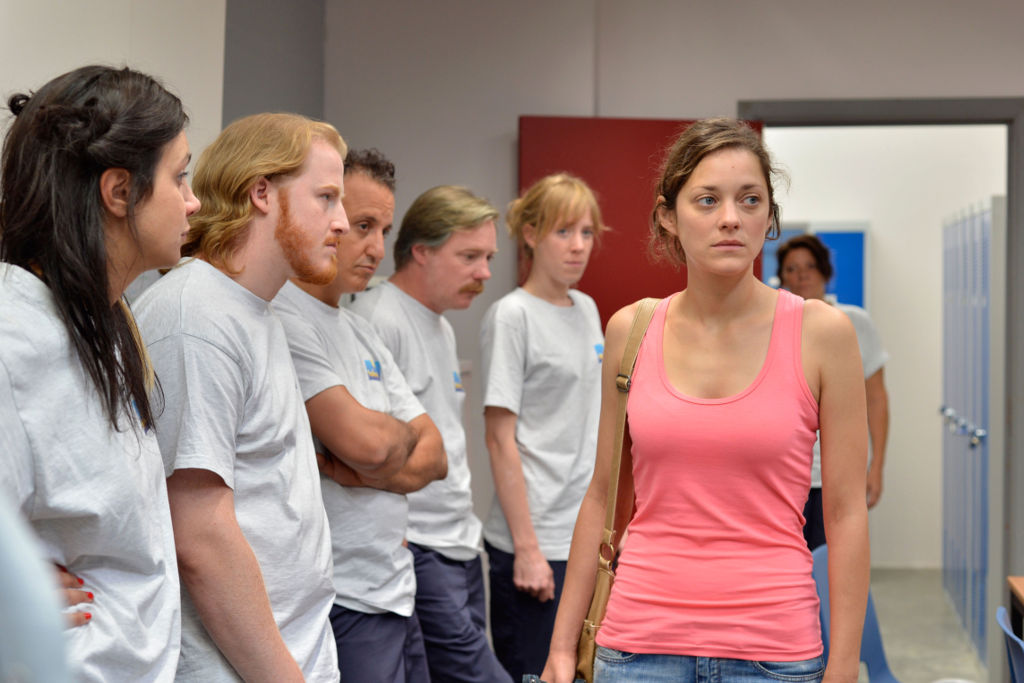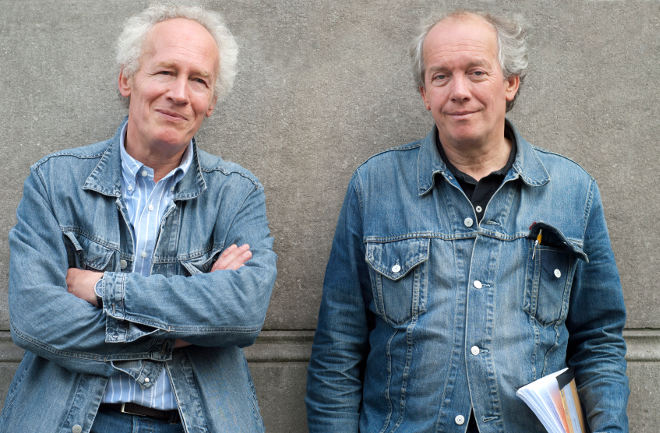How To Make Economic Injustice Entertaining: An Interview With The Dardenne Brothers
Starring Marion Cotillard, their new film 'Two Days, One Night' weds capitalist critique to a warm, humanist core.

Finely-wrought, closely-observed stories of economic anxiety in industrial Belgium may not sound like the flashiest basis for a career in cinema, but since their 1996 breakout film The Promise, brothers Jean-Pierre and Luc Dardenne have consistently performed the difficult trick of turning the cold realities of economic injustice into quietly touching human drama.
Made in a resolutely unflashy, social-realist style, their films have earned the writer-directors the gratitude of critics worldwide – as well as numerous awards, including a rare pair of Palmes d’Or; for Rosetta, in 1999, and for The Child, in 2005.
Their latest film, Two Days, One Night, stars Marion Cotillard as Sandra, a solar panel factory labourer who is emerging from a severe depressive episode. When she learns that her co-workers have—in her absence from work—voted to eliminate her job in favour of receiving their annual bonuses, she spends a weekend trudging around from house to house, striving to convince her colleagues to save her job even at a cost to their own personal finances.
The film is receiving worldwide acclaim—Stephanie Bunbury, in the Sydney Morning Herald, muses that it may be the brother’s best work yet—and in June it took out first prize at the Sydney Film Festival.
On the eve of its national release, Junkee spoke with Jean-Pierre and Luc by phone with the assistance of a translator.
–
A Road Movie To An Uncertain Destination
Although there’s little question that Sandra’s cause is righteous, the Dardennes don’t skimp on the social awkwardness of her quest. Despite—or perhaps because of—her delicate psychological condition, she refuses to beg or plead for her co-worker’s sympathy. Instead she calmly asks them to behave altruistically, though recognising that they are under no obligation to do so.
This dignified approach allows the brothers to maximise the tension they wring from each encounter with Sandra’s colleagues. The filmmakers recognise that there is something confronting about being directly asked for charity: Sandra’s forthrightness in forcing her co-workers to recognise her needs inspires deflection in some, sorrow in others, and sometimes outright anger.
The brothers offer the observation that the film is something like “a road movie or a railway movie – in the sense that at every station there is a new vision of the situation, even though it’s a different character.” They’re careful to delineate the individual reasons Sandra’s colleagues have for wanting their bonuses. Their needs range from specious—one couple wants to build an extension on their house—to absolutely dire. “Every one of the coworkers has their own reasons for doing what they are doing and saying what they are saying – because they themselves are in a precarious situation; they themselves are very scared to lose their jobs.”
The overall picture they paint is of an industrious lower class just barely clinging on to solvency, stuck in an economic system that dictates there are no winners unless someone else loses.
Financial Crisis
The brothers have long made films that engage with economic issues. The Child, from 2005, depicts a young man, played by Jérémie Renier, who sells his newly born infant onto the adoption black market for some extra cash. In The Kid with the Bike, the same actor returns as the father of the titular kid, who has abandoned his son in state housing in order to relieve himself of the financial burden.
But Two Days, One Night has special contemporary significance. Having carried the germ of the story around for ten years, the brothers say that it was only with the advent of the global economic crisis, with the “loss of jobs, and the poverty, and the various social problems that we decided that the time is now, we have to tell the story.”
Although their films are deeply rooted in their home country—most particularly in their industrial hometown of Liège—the Dardennes are keen to emphasise the story’s international significance, especially for the global youth. “The situation for the young people in Europe at the moment is quite desperate,” they say. “In Spain, for instance, between forty and fifty per cent of the young do not have a job, and they migrate, if they can. They go to other European countries, or they migrate to Canada, and various other countries. So even though we are talking here of an individual for the film, at the same time the general situation is like this.”
Finding A Way Out
But the film isn’t all economic gloom. The Dardenne brothers have essentially hitched a critique of capitalist conditions to a warm, humanist core. As they say, the film is “a statement about the economic crisis and its social problems, but it is also about individual endeavor, and courage, and fighting back.”
Depression is, among other nasty things, a rather selfish illness. Sandra’s condition often makes her unable to see past herself to her role in the lives of her family and colleagues. In the process of journeying to her co-workers, Sandra also journeys outside herself, to some sense of communal feeling with others.
“At first, her reaction is, ‘I have to think about myself first’ – referring to the others who are showing any solidarity towards her. But they are changing, because she is changing them. And she herself, who probably viewed herself as the victim to start with, is also fighting that idea that she will give in.”
The romance of trade unionism feels like it’s at an all-time low (especially in Australia, what with this old thing), but the Dardennes have found a canny way to dramatise an essentially political issue. Sandra’s quest is not just a journey toward her own wellbeing, it’s also the embodiment of the kind of back-breaking, tedious, but ultimately rewarding cultivation of labour solidarity that most industries would rather see repressed.
The Dardennes have pulled off this kind of sleight of hand in earlier films as well. In their previous film, The Kid with the Bike, a young boy, after being abandoned by his father, is redeemed by the friendship of a young woman, who selflessly agrees to help care for him. It’s a literal dramatisation of the helping hand of welfare.
Reflecting on their themes, the brothers allow that their films are about “characters who are very marginalised, who are very vulnerable, and it is the meeting with someone else—in some way a savior, or a hand given to them, or a shoulder to try on—that shows them a way out.” Beyond the international context, beyond the financial crisis, their films are about the necessity of human connection: “How an isolated individual—vulnerable, marginalised—can actually find a way out, can actually solve a problem, can actually have a life – or rediscover a life.”
–
Two Days, One Night will be released in Australian cinemas on Thursday November 6.
–
James Robert Douglas is a freelance writer and critic in Melbourne, and the interviews editor of The Lifted Brow. His work has been found in The Big Issue, Meanland, Screen Machine, and the Meanjin blog. He tweets from @jamesrobdouglas
